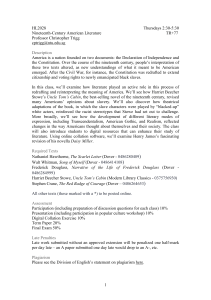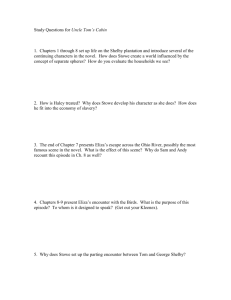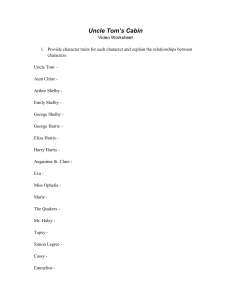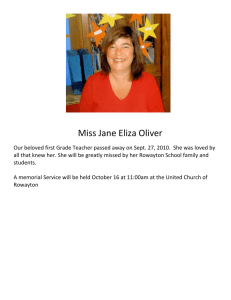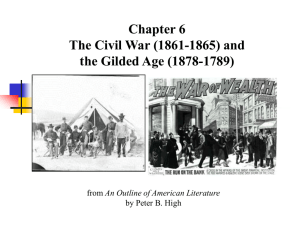Uncle Tom`s Cabin Harriet Beecher Stowe
advertisement
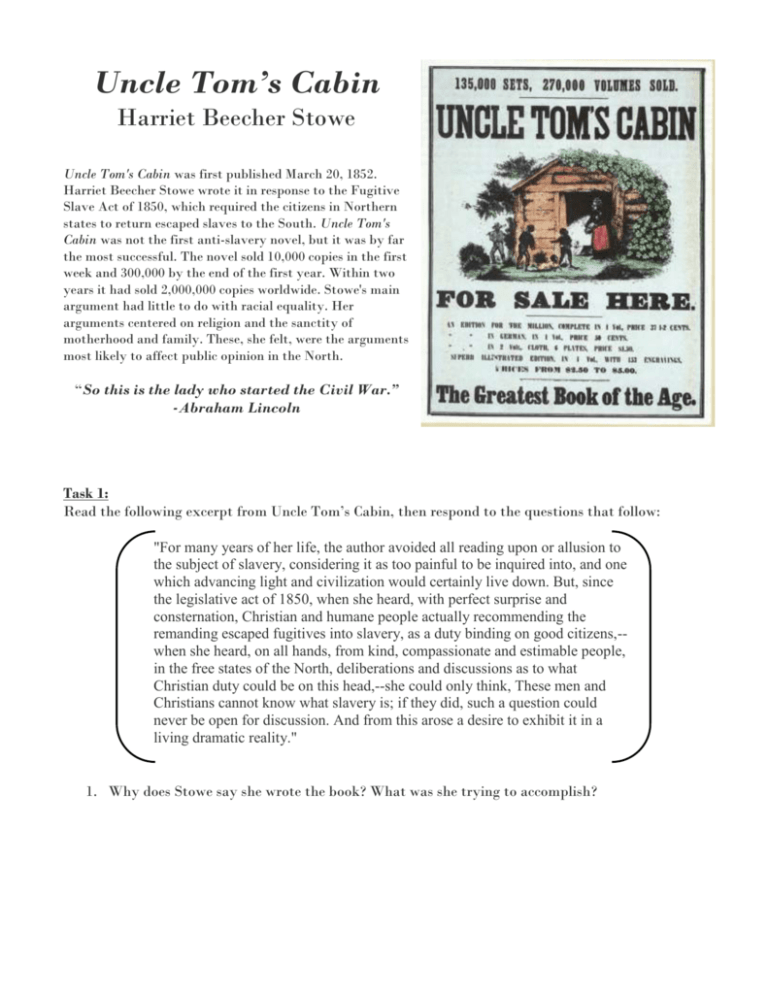
Uncle Tom’s Cabin Harriet Beecher Stowe Uncle Tom's Cabin was first published March 20, 1852. Harriet Beecher Stowe wrote it in response to the Fugitive Slave Act of 1850, which required the citizens in Northern states to return escaped slaves to the South. Uncle Tom's Cabin was not the first anti-slavery novel, but it was by far the most successful. The novel sold 10,000 copies in the first week and 300,000 by the end of the first year. Within two years it had sold 2,000,000 copies worldwide. Stowe's main argument had little to do with racial equality. Her arguments centered on religion and the sanctity of motherhood and family. These, she felt, were the arguments most likely to affect public opinion in the North. “So this is the lady who started the Civil War.” -Abraham Lincoln Task 1: Read the following excerpt from Uncle Tom’s Cabin, then respond to the questions that follow: "For many years of her life, the author avoided all reading upon or allusion to the subject of slavery, considering it as too painful to be inquired into, and one which advancing light and civilization would certainly live down. But, since the legislative act of 1850, when she heard, with perfect surprise and consternation, Christian and humane people actually recommending the remanding escaped fugitives into slavery, as a duty binding on good citizens,-when she heard, on all hands, from kind, compassionate and estimable people, in the free states of the North, deliberations and discussions as to what Christian duty could be on this head,--she could only think, These men and Christians cannot know what slavery is; if they did, such a question could never be open for discussion. And from this arose a desire to exhibit it in a living dramatic reality." 1. Why does Stowe say she wrote the book? What was she trying to accomplish? 2. Why did she choose to write a novel instead of publishing newspaper articles, making speeches, or performing some other action? 3. The legislative act of 1850 was also called "the Fugitive Slave Act." From this paragraph, what do you think "the Fugitive Slave Act" did? Task 2: Read the following excerpt from the conclusion of Uncle Tom’s Cabin, then respond to the questions that follow: "The writer has given only a faint shadow, a dim picture, of the anguish and despair that are, at this very moment, riving thousands of hearts, shattering thousands of families, and driving a helpless and sensitive race to frenzy and despair. There are those living who know the mothers whom this accursed traffic has driven to the murder of their children; and themselves seeking in death a shelter from woes more dreaded than death … "And you, mothers of America … I beseech you, pity the mother who has all your affections, and not one legal right to protect, guide, or educate, the child of her bosom! … I beseech you, pity those mothers that are constantly made childless by the American slave-trade! And say, mothers of America, is this a thing to be defended, sympathized with, passed over in silence? Do you say that the people of the free state have nothing to do with it, and can do nothing? Would to God this were true! But it is not true. The people of the free states have defended, encouraged, and participated; and are more guilty for it, before God, than the South, in that they have not the apology of education or custom. "If the mothers of the free states had all felt as they should, in times past, the sons of the free states would not have been the holders, and, proverbially, the hardest masters of slaves … "… You pray for the heathen abroad; pray also for the heathen at home. And pray for those distressed Christians whose whole chance of religious improvement is an accident of trade and sale; from whom any adherence to the morals of Christianity is, in many cases, an impossibility, unless they have given them, from above, the courage and grace of martyrdom." 1. What arguments did Stowe put forth against slavery? (List) 2. What audience was she trying to reach with her message? Why? 3. Women in the nineteenth century could not vote, so why did Stowe make a point of addressing mothers? Task 3: Read the following scene, then discuss the questions that follow. Narrator: Eliza, a slave, has run away from her master with her son Harry. Her master had sold Harry away from her, but Eliza fled before they could be separated. After a long journey, Eliza finally managed to cross the Ohio River by leaping across the floating blocks of ice. At the far bank of the river, a man helps her to shore: Mr. Symmes: "Yer a brave gal, now, whoever ye ar!" Narrator: Eliza recognized the voice and face of a man who owned a farm not far from her old home. Eliza: "O, Mr. Symmes!--save me--do save me--do hide me!" Mr. Symmes: "Why, what's this? Why, if 'tan't Shelby's gal!" Eliza: "My child!--this boy!--he'd sold him! O, Mr. Symmes, you've got a little boy!" Mr. Symmes: "So I have. Besides, you're a right brave gal. I like grit, wherever I see it. I'd be glad to do something for ye but then there's nowhar I could take ye. The best I can do is to tell ye to go thar." Narrator: Mr. Symmes pointed to a large white house which stood by itself, off the main street of the village. Mr. Symmes: "Go thar; they're kind folks. Thar's no kind o' danger but they'll help you,--they're up to all that sort o' thing." Eliza: "The Lord bless you!" Mr. Symmes: "No 'casion, no 'casion in the world. What I've done's of no 'count." Eliza: "And, oh, surely, sir, you won't tell any one!" Mr. Symmes: "Go to thunder, gal! What do you take a feller for? Of course not. Come, now, go along like a likely, sensible gal, as you are. You've arnt your liberty, and you shall have it, for all of me." Narrator: The woman folded her child to her bosom, and walked firmly and swiftly away. The man stood and looked after her. Mr. Symmes: "Shelby, now, mebbe won't think this yer the most neighborly thing in the world; but what's a feller to do? If he catches one of my gals in the same fix, he's welcome to pay back. Somehow I never could see no kind o' critter a strivin' and pantin', and trying to clar theirselves, with the dogs arter 'em and go agin 'em. Besides, I don't see no kind of 'casion for me to be hunter and catcher for other folks, neither." Narrator: So spoke this poor, heathenish Kentuckian, who had not been instructed in his constitutional relations, and consequently was betrayed into acting in a sort of Christianized manner, which, if he had been better situated and more enlightened, he would not have been left to do. 1. What reasons does Mr. Symmes give for not returning Eliza and Harry to their masters? (List) 2. What is the narrator saying about the Fugitive Slave Act in the last sentence? 3. How does this narrative compare/contrast with Stowe's arguments against slavery in the book's conclusion? 4. Is it more convincing? More compelling? Why or why not? Task 4: Read the following excerpt from the novel, then answer the discussion questions at the end: Two slaves, Cassy and Emmeline, are hiding from their cruel master, Simon Legree. Simon threatens to beat Tom if he will not tell where Cassy and Emmeline are hiding. Tom, a Christian who has always been a loyal, hardworking slave, refuses and Simon swears that he'll conquer Tom or kill him: "Tom looked up to his master, and answered, "Mas'r, if you was sick, or in trouble, or dying, and I could save ye, I'd give ye my heart's blood; and, if taking every drop of blood in this poor old body would save your precious soul, I'd give 'em freely, as the Lord gave his for me. O, Mas'r! don't bring this great sin on your soul! It will hurt you more than 't will me! Do the worst you can, my troubles'll be over soon; but, if ye don't repent, yours won't never end!" "Like a strange snatch of heavenly music, heard in the lull of a tempest, this burst of feeling made a moment's blank pause. Legree stood aghast, and looked at Tom; and there was such a silence, that the tick of the old clock could be heard, measuring, with silent touch, the last moments of mercy and probation to that hardened heart. It was but a moment. There was one hesitating pause,--one irresolute, relenting thrill,--and the spirit of evil came back, with seven-fold vehemence; and Legree, foaming with rage, smote his victim to the ground. "Scenes of blood and cruelty are shocking to our ear and heart. What man has nerve to do, man has not nerve to hear. What brother-man and brother-Christian must suffer, cannot be told us, even in our secret chamber, it so harrows the soul! And yet, oh my country! these things are done under the shadow of thy laws! O, Christ! thy church sees them, almost in silence!" 1. How does Stowe portray slaveholders in this scene? 2. How does she portray slaves? 3. How do you think white Southerners felt when they read of Simon Legree's cruelty in Uncle Tom's Cabin?
